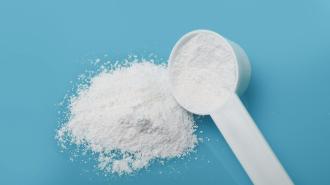From blood transfusions to gene therapies to fecal transplants, longevity researchers are exploring radical ideas in pursuit of a treatment that will not only allow people to live longer, but stay healthy well into old age.
Now, a new study in mice and monkeys suggests that one ingredient to a longer, healthier life may be taurine, a micronutrient commonly found in energy drinks. It isn’t clear whether the results in animals translate to humans, and a large, long-term clinical study will be needed to see whether the results bear out.
The idea: Our bodies naturally produce taurine to help with immune function, metabolism, and more. It is also found in many foods, and some people take taurine supplements to improve athletic performance (despite a lack of proof that it has any benefit).
“If taurine is regulating all these processes that decline with age, maybe taurine levels in the bloodstream affect overall health and lifespan.”
Vijay Yadav
Vijay Yadav, an assistant professor of genetics and development at Columbia University, was researching osteoporosis when he discovered that taurine helps with bone formation. That, combined with other researchers’ work linking taurine levels to other health issues, got him thinking about its potential role in aging.
“We realized that if taurine is regulating all these processes that decline with age, maybe taurine levels in the bloodstream affect overall health and lifespan,” said Yadav, who led the new study, published in the journal Science.
The study: To explore this possible relationship between taurine and longevity, Yadav’s team — comprising more than 50 researchers from around the globe — started by looking at taurine levels in the blood of mice, monkeys, and people and found that they did decline significantly with age.
Next, they split 250 middle-aged mice into two groups, giving one group a daily dose of taurine and the other a control solution. At the end of the experiment, the females and males in the taurine group lived 12% and 10% longer, respectively, than their control equivalents.
To find out whether taurine could help mice stay healthy longer — not just alive longer — the researchers fed female mice taurine daily for about a year, starting at age 14 months (equivalent to middle age for people).
At the end of that experiment, the mice fed taurine were healthier than the controls in almost every way. They had more energy, denser bones, and stronger muscles. They even looked “younger” on a molecular level, with fewer senescent “zombie cells” and less DNA damage.
When the researchers tried the experiment with middle-aged monkeys, feeding some taurine for six months and others a control, they reported similar health effects.
“The results are consistent with the possibility that taurine deficiency contributes to human aging.”
Vijay Yadav
The researchers haven’t conducted any trials of taurine’s effect on humans, but they did look at the taurine levels of 12,000 people over the age of 60 and found that those with higher natural levels were healthier, with less inflammation, hypertension, obesity, and more.
“These are associations, which do not establish causation,” said Yadav, “but the results are consistent with the possibility that taurine deficiency contributes to human aging.”
Yadav’s team also measured taurine levels in athletes and sedentary individuals before and after strenuous exercise and found that levels increased in everyone after they worked up a sweat, regardless of their baseline physical ability.
“[This] suggests that some of the health benefits of exercise may come from an increase in taurine,” said Yadav.
Looking ahead: The only way to know for sure if taurine supplements could increase longevity in people is to conduct controlled clinical trials, and based on his team’s findings — and the nature of taurine — Yadav thinks such trials would be worthwhile.
“Taurine is naturally produced in our bodies, it can be obtained naturally in the diet, it has no known toxic effects (although it’s rarely used in concentrations used in this study), and it can be boosted by exercise,” he said.
Trials to extend human longevity are difficult to run, because humans live for a long time, so it would require a large study and a lot of followup to get a clear answer. But if such a study gets funded and approved, it could provide valuable evidence about how aging works and if it’s possible to slow it down.
We’d love to hear from you! If you have a comment about this article or if you have a tip for a future Freethink story, please email us at [email protected].






